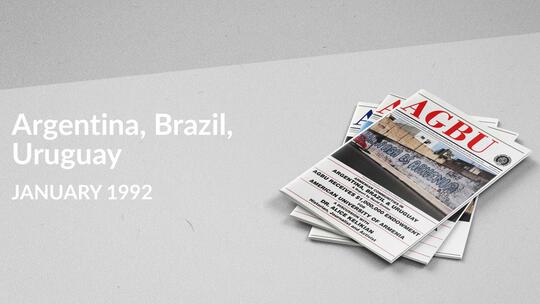by David Zenian
YEREVAN - If teaching is difficult, imagine a situation where you have to erase what has become second nature to generations of youngsters born and raised under the shadow of communist ideology.
"We are not out to teach anti-communist propaganda. People are already fed up with communism. What we are trying to do is establish a new learning process which brings out the best in today's youth," says Lena Mardirossian, an English-language teacher at School Number 114 in central Yerevan.
Ms. Mardirossian, herself the product of the "old school" of education, is one of hundreds of teachers around the country who are struggling to "forget how things were done in the past". "The freedom to change came as a bit of a surprise. In the difficult days preceding independence the government was at best trying to cope with the new realities facing the nation. We have a long way to go, but we have already started changing," she said.
Old textbooks are being constantly revised. In some cases this means the removal of dozens of pages of "subject matter tainted with Red ideology." In others, efforts are made to introduce new textbooks.
School Number 114, like a dozen similar public schools in the country, prides itself as a "center for learning the English language."
Located among a cluster of residential apartment buildings where laundry hangs from every balcony and housewives gossip across the narrow alleyways, the four story school accommodates close to 1,500 students ranging from seven to seventeen year old.
"The distractions are numerous. The children joke about the laundry hanging from a neighbor's balcony. This place is full of Vartanig jokes," she said with a smile. Vartanig is the "legendary" fifth-grader around whom thousands of jokes have been woven over the past several decades.
But the jokes aside, School Number 114 and many others like it, are struggling to modernize and make education not only more flexible, but also change it into a process geared toward the well-being of the society at large.
In the absence of a well-defined education policy, the task of changing the teaching process is - at least for the time being - in the hands of the school principles and the teachers.
"We now encourage more discussion in class. This allows the children not only to practice their spoken English, but also gives them a chance to think out loud and express their own views on the subject matter that they have read at home," Ms. Mardirossian said.
One such occasion was at an English Literature class where a group of ninth-graders discussed William Shakespeare's Hamlet.
"The children sometimes politicize the issues, something which was not allowed in the old days. We do not want them to learn as parrots, and therefore, we give them all the freedom they need to learn how to express themselves," she said.
"We are also encouraging the formation of special discussion groups, and on a different level, parent-teacher groups to create learning processes in which everyone brings his share," Ms. Mardirossian said.
She also admits that teachers need to be re-educated. We have to learn as much as the students. For example, we have to learn to deal with questions like absenteeism and cheating. These are important issues which have been ignored for a long time," she said.
"In the old days, we just punished the child. Now we have to try and understand why he cheated or why he was absent from class. Maybe we have to learn to become social workers as much as being teachers," she said with a smile.
The "new world of education", as some teachers define the learning process, "means resources like hundreds of thousands of new textbooks and reading materials, and even paper, pencils, chalk and similar tools which you people in America take for granted."
Like fellow teachers at a number of Yerevan area public schools, Ms. Mardirossian said the shortage of supplies was a chronic problem. "All the so-called old teacher's manuals are of no use anymore. The authorities are working around the clock to introduce new textbooks, but printing is a major problem," she said. "We used to get all our foreign-language books from Moscow. Now, we either cannot pay for them anymore, or we don't want them anyway. This means we have to continue to improvise until a solution is found," she said.
Officials at the Ministry of Education say the rising cost of paper, and the introduction of changes in the subject matters, was delaying the introduction of new textbooks into the public school system which caters to an estimated half-a-million elementary and secondary students.
"Given the hardships facing the nation, there are fears that education could suffer if the improvements are not speeded up. "We cannot continue to improvise without real direction from higher up," one teacher said.
Like many questions in Armenia, there are no quick and easy answers to the difficulties facing both students and teachers alike. One approach, Ms. Mardirossian added, was "linkage" between schools in Armenia with schools in the Armenian Diaspora.
"Why not start a sister-school program between schools here and Armenian and American schools in California. I am sure the establishment of such direct ties will be beneficial to both parties and especially to our youth who have a lot to learn from the free world," she said.
"As teachers, we would not only welcome, but also encourage such programs which we also need as educators. There is so much we can learn from your teaching methods," she said with apparent anticipation.






